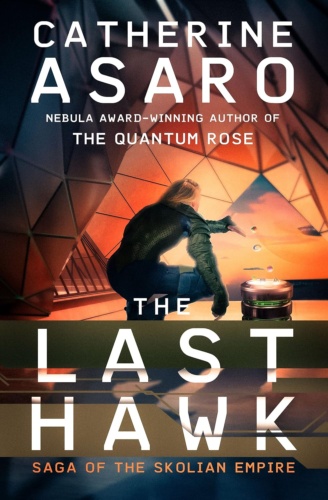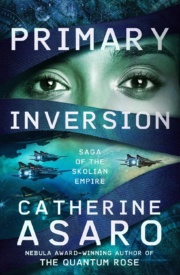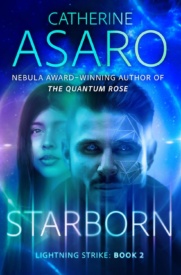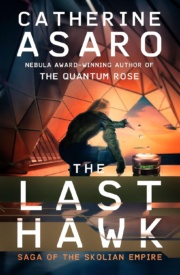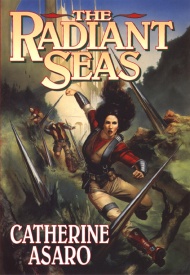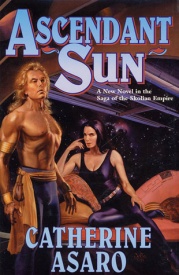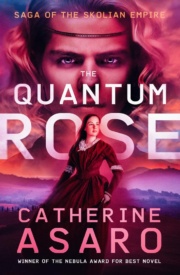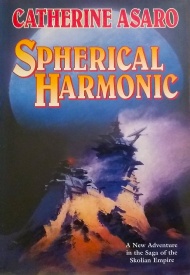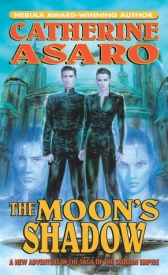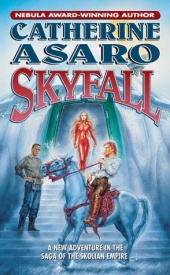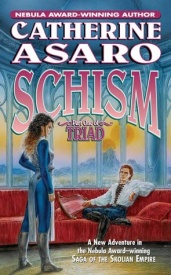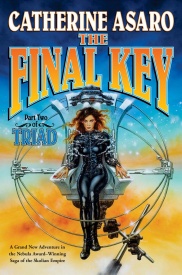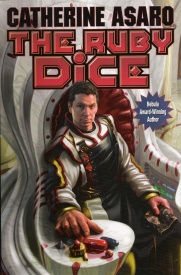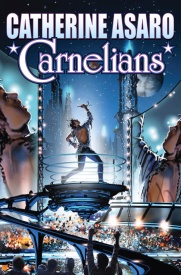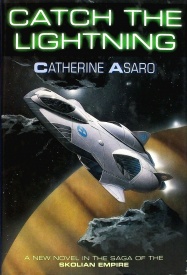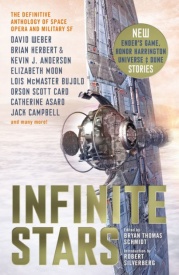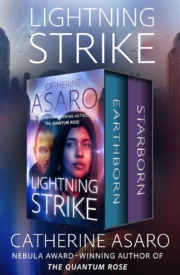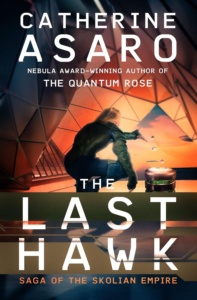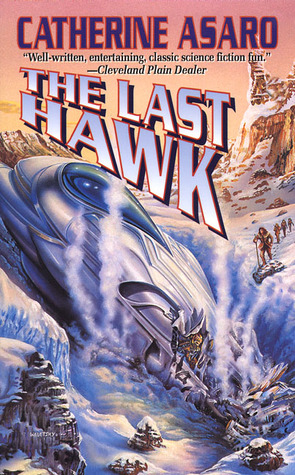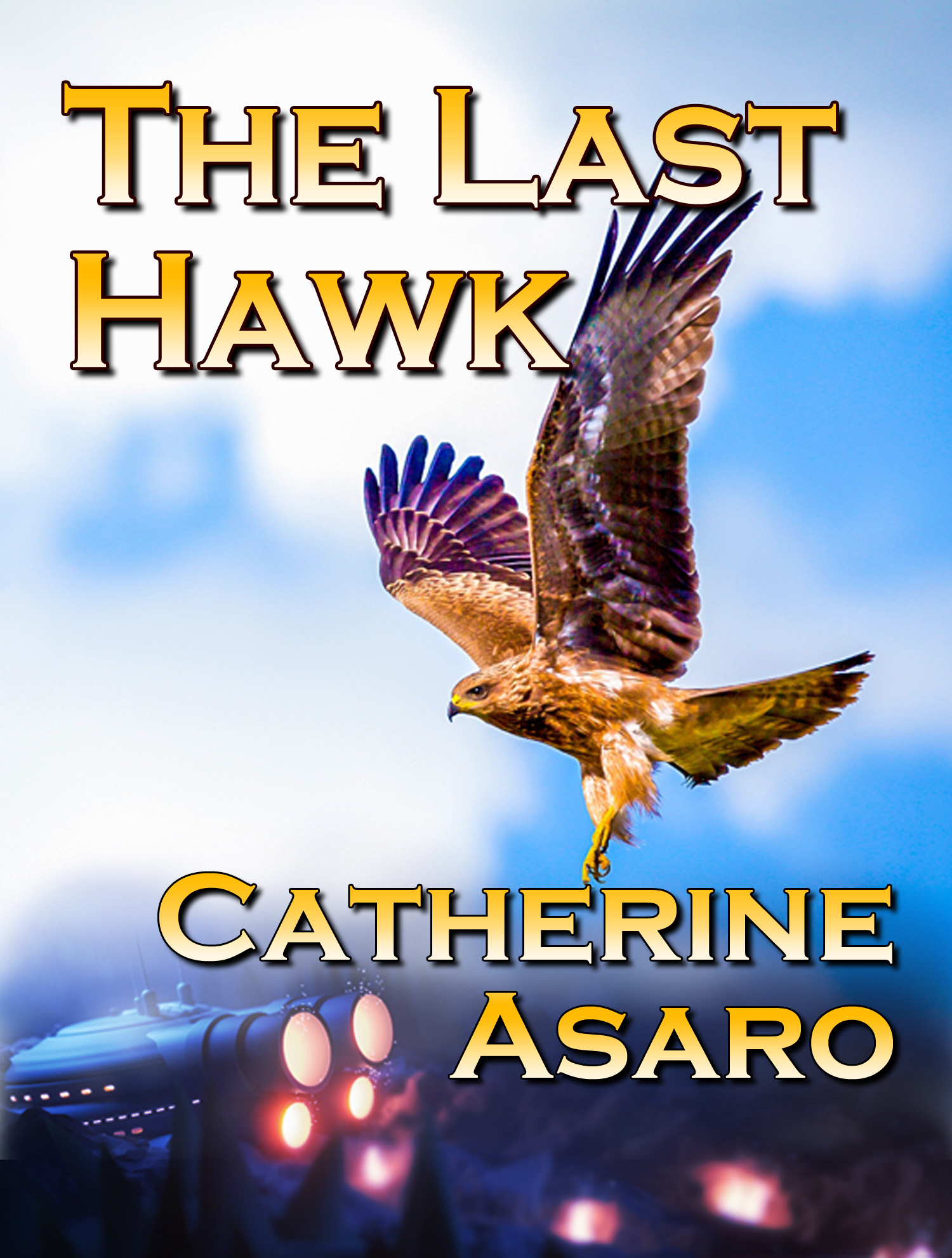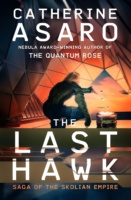The Last Hawk
Book 3 in the Saga of the Skolian Empire
“Powerful characterization and intriguing scientific concepts . . . an elegant subtlety and a far-reaching sense of destiny that carries [Asaro] to the highest rank of master storyteller.” —Romantic Times
Reeling from a battle, pilot Kelric Valdoria crash-lands his Jag starfighter on Coba, the closest safe planet he can find after a Trader squad cripples his ship. Although the military of Kelric’s people have given Coba Restricted status, Kelric sees no reason for such draconian measures to isolate the seemingly benign world.
While recovering, the dashing Kelric becomes the target of affection for high-powered women in Coba’s matriarchal society, including Deha Dahl, an Estate Manager, and young Ixpar Karn, the chosen successor of the Minister. Distracted by their flirtations, Kelric doesn’t at first realize the Restricted status of the planet was their own choice—and that they can’t risk letting him go.
However, Kelric’s internal biomech system is failing, causing his brain to malfunction. His only hope is to escape. But when his attempt fails, ending in the death of a guard, he must face a trial that could mean his execution, unless he can win the trust of the people who both covet and fear him . . .
Start Reading
The Last Hawk
Excerpt
Jump to Ordering Options ↓
Prologue
The ship’s controls wobbled in and out of focus. Kelric tried to rub his eyes, but his arm refused to respond. The exoskeleton on his pilot’s seat had jammed around his body. When he fumbled for the catches, his fingers scraped over the mesh.
On his fourth attempt, Kelric managed to release the exoskeleton. As it retracted, he fell forward, sprawling across the weapons grid in the cockpit. Red panels glowed all over the controls, bathing the ship in crimson light.
A solitary green light shone among the red. One of his inversion engines still worked. It had saved his life.
“I’m inverted,” Kelric mumbled. The same attack that had crippled his Jag starfighter had also kicked it from the sublight universe into inversion, hurling him away from his attackers before they could blast him into slag.
The medkit above him hadn’t released. He reached for it, but his arm faltered in midair and dropped back onto the grid. Not that it mattered. He needed far more help than a kit could give, more even than provided by his nanomeds, the tiny cell-repair machines in his body.
Pain throbbed in his arm from a bone-deep gash. In the exoskeleton he had felt numb, probably because it injected him with an anesthetic. Or maybe the biomech web in his body released a drug that blocked pain receptors in his brain. It would only give him so much of the drug, though, before its safety routines kicked in to prevent an overdose or brain damage.
His arm hurt too much to move. Even if it intended to stay put, however, his ship was going somewhere, taking him away from the Traders. He had been out alone, on reconnaissance, when a Trader squad caught him. He hoped they all inverted into the gravity well of a star and finished their careers as kindling for the local furnace.
An alarm sputtered. Lifting his head, he saw that the green light had turned yellow. His last inversion engine was failing.
A port. He needed a starport. He had to find a place to land, and fast. Closing his eyes, he tried to clear his mind.
Bolt, respond, he thought.
The node in his spine answered. Attending. Its signal traveled along bio-threads in his body to his brain, where bio-electrodes converted it into neural firing patterns. The process also worked in reverse, letting him “think” to the node.
Status of nanomeds, he thought.
Series G and H functional but depleted, Bolt answered. Series 0 nonfunctional. All other series exhibit decreased function.
Kelric grimaced. He was so far gone, he couldn’t remember what those meds did. Think, he told himself. The tiny molecular laboratories cruised his body, seeing to his health. Each carried a picochip that coordinated with other meds and told them how to replicate. Bolt ran the show. Like the conductor of a symphony, it directed the picoweb, the bio-threads in his body, and the electrodes in his brain. The military had integrated the system into his body fourteen years ago, when he was twenty, the year he received his officer’s commission.
Bolt, he thought. What happened to my biomech?
That last hit destroyed the safeties that protect your link to the ship. It damaged your biomech web. I’m trying to fix it, but I can’t do a full repair. You must proceed immediately to an ISC medical facility.
If he hadn’t hurt so much, Kelric would have laughed. Wish I could. He took a ragged breath. Give me a status report.
Accessing optical nerve.A ghostly image formed in the air health views of Kelric’s body.Bolt highlighted his circulatory system, showing a torn artery leaking blood. This needs the most immediate treatment.
Kelric exhaled. His only hope to speed the healing process more than his meds had already done came from the final component of his internal systems: his Kyle centers. Microscopic organs in his brain made it possible for his brain waves to interact with those of people nearby, letting him pick up their moods. It also allowed him to exert a greater than normal amount of biofeedback control over his own body.
Kelric concentrated, using his biofeedback training. He helped speed the repair of his damaged artery, control his blood flow, and bring in nutrients. When he finally surfaced from his trance, he felt steadier, enough that he could sit up, holding his arm against his chest.
An alarm warned again of the dying engine.
“Navak,” he said. “Take us out of inversion, into sublight space.”
No response came from the navigation-attack node in the ship’s Evolving Intelligence brain.
“Navak,” he repeated. “Initiate navigation mode.”
Silence.
Bolt, give me the ship’s emergency menu, he thought.
A display formed in his mind. The symbol for the emergency engine shutoff showed as a running cheetah turning into a crawling snail. Only one of each animal appeared, a reminder that only one of his four inversion engines still functioned. The cheetah blinked off and on, warning that it too would soon disappear.
Toggle emergency shutdown, he thought.
Nothing happened.
Bolt, toggle it!
A twisting sensation hit Kelric. The effect intensified with a nauseating mental wrench and then stopped.
Bolt? he thought.
We have dropped into normal space, Bolt answered.
Kelric sagged in his seat, swept with relief. Sublight. He was safe.
He was also lost, light-years away from his previous position, drifting in space like interstellar flotsam. Time to find a beach where he could wash up.
“Navak,” he said. “Respond.”
Nothing.
Kelric slid his hand around his waist, searching at the base of his spine. A prong should connect into a socket in his back, linking his bio-mech web to the ship. Apparently when he fell across the weapons grid, it pulled the prong out of his body, breaking it in two.
Maybe a wireless link would work. His socket could also act as an infrared transmitter, a less reliable method than a physical link, but better than nothing.
Activate IR receptors, he thought.
IR nonfunctional, Bolt thought.
Damn. He needed another approach. With his Kyle enhancements, maybe he could contact the ship using his brain waves. It helped that he was inside the ship; Kyle effects fell off with distance. Concentrating, he tried to kick its EI brain awake with his mind.
A ghostly green marble appeared in the air in front of him, casting an eerie light over the cockpit. It took him a moment to recognize it as the default display of a star map.
“Planet,” Kelric said.
Navak’s audio made a scraping noise.
He tried again. “Planet.”
Nothing.
Navak, he thought, desperate. You have to respond.
A sentence formed in the air, green words in Navak’s default font: HAV#%SPOND IS AN UNIDENTIFIABLE COMMAND.
Relief washed over Kelric. Planet, he thought.
PLANET WHAT? Navak printed.
Find me one. Or a base. Someplace habitable we can reach before engine four dies.
SEARCHING.
Kelric waited.
And waited.
Maybe no place was near enough. Or Navak was too damaged to do a proper search. Or the engine couldn’t—
OBJECT 85B5D-E6-JHEO SATISFIES YOUR REQUIREMENTS,Navak printed.
What is it?
DOES ‘IT’ REFER TO OBJECT 85B5D-E6-JHEO?
For flaming sake. What else would I mean?
NO DATA EXISTS ON AN OBJECT CALLED FLAMING S%, Navak printed.HOWEVER, ‘FLAMING’ APPEARS IN LANGUAGE FILE FOUR UNDER PROFANITY. DO YOU WANT TO KNOW MORE?
What I want, Kelric thought, is everything you have on object— he squinted at the screen—85B5D-E6-JHEO.
IT IS A PLANET. NAME: COBA. INHABITANTS: HUMAN. STATUS: RESTRICTED.
Kelric closed his eyes, hit with a relief so intense, it felt tangible. Inhabitants. Help. He just might survive this mess after all.
Take ship to Coba, he thought.
BOOK ONE
Years 960-966 of the Modern Age
Dahl
Chapter One: First Move, The Golden Ball
Deha Dahl, the Manager of Dahl Estate, sat playing dice. She placed a cube in the structure of balls, pyramids, and polyhedrons on the table. Her opponent, one of her more intrepid Estate aides, wiped sweat from her forehead as she studied the dice.
Deha had chosen the Coral Room for the game, a round chamber filled with light. Painted a deep rose near the floor, the walls shaded into lighter hues and then into white at the top. Coral mosaics inlaid in the domed ceiling. The room’s three doorways each arched to a point and then curved out in a circle graced with a stained-glass window. Deha insisted on using only the best rooms when she played the dice game of Quis with her aides, her peers—and her adversaries.
Their audience of Estate aides sat in carved chairs around the table. They watched the game in silence, some no doubt wishing they could take the perspiring aide’s place and others grateful it wasn’t them in this duel of minds. They all knew she had called this session to see how her opponent, a younger member of her staff, handled the pressure of playing against a dice queen.
A hand touched Deha’s shoulder. She looked up, surprised to see an aide who wasn’t among the group she had selected to view the session.
The aide bowed. “I’m sorry to disturb you, ma’am. Captain Hacha thought you would want to know right away. A craft crashed up in the mountains near Dahl Pass.” She paused. “It doesn’t appear to be from Coba.”
Once Deha would have shipped the bearer of such news off to the setting-sun-asylum. No longer. She stood up. “Have Hacha meet me in my office.” She glanced at her dice opponent. “We will continue later.”
The aide nodded and started to speak. Then she stopped, her gaze shifting to a point beyond Deha. She stood up and bowed, not to Deha but to someone else. Following her gaze, the rest of Deha’s aides stood up in a flurry of moving chairs, and every one of them bowed.
Deha turned to see who evoked such a reaction from her staff. A retinue had appeared in the doorway, soldiers in the uniform of her CityGuard. A girl stood with them, a gray-eyed child on the verge of womanhood, with fiery hair curling around her face and falling in a thick braid down her back. Tall for her age, she looked like the reincarnation of an incipient warrior queen who had transcended the millennia and stepped from the Old Age into the modern world.
Deha crossed to the girl and bowed. “Ixpar. What brings you here?”
Ixpar spoke with barely contained excitement. “I heard about the craft that crashed near Dahl Pass. I came to help the rescue party.”
Deha silently cursed. She would be a fool to let Ixpar join them. Ixpar Karn: it meant Ixpar from the Estate of Karn. Of the Twelve Estates, Karn was the largest, bigger even than Dahl. It also ranked as the oldest. Its Manager not only ruled Karn; as Minister she stood highest in the hierarchy of all the Estates. She had chosen this girl to be her successor. Someday Ixpar would rule Coba.
However, Deha didn’t want to alienate Ixpar, either. The girl already showed skill in the flow of power among the Estates. Rumor claimed the Minister sometimes placed her young successor’s opinions above even those of her senior advisers.
Political prudence won out. “Very well,” Deha said. She raised her hand as Ixpar’s face lit with enthusiasm. “I want you to stay with my escort at all times.” She glanced toward the mountains. “We have no idea what crashed up there.”
In her guest suite, Ixpar changed into hiking clothes: a sweater, suede pants, and a leather jacket. When she finished, she found her two bodyguards outside in the entrance foyer, both armed with stunners.
They joined Ixpar in her walk through the Estate, just as they always did. So often she felt tempted to slip away from them. She resisted the urge, knowing only she would find it entertaining.
Guards or no guards, though, she enjoyed the walk. She found it hard to believe the Estate had once been an armed fortress. Its harsh interior had long ago given way to its present beauty, its stone floors softened with carpets and its formerly barred windows replaced by faceted yellow glass. Some corridors formed the perimeter of large halls, set off from them by widely spaced columns. Just as the ancient queens of Dahl had ruled from the Estate, so Deha and her staff now used it as their residence.
Ixpar left the Estate with her escort and headed through the city. Cobblestone streets wound among buildings of pale blue stone with turreted roofs. Spires topped the turrets and golden chains hung from their tips, strung with metal Quis dice. When the wind blew, the chains swung and clinked, sparkling in the sun. She passed golden temples dedicated to the sun goddess Savina or the dawn god Sevtar, and ball courts filled with players, women and men laughing in the wind. What a glorious day! It felt bright, gusty, and fresh. She wanted to jump. Shout. Get into trouble. Of course she couldn’t, but she enjoyed imagining the possibilities.
Ixpar knew the route to the airfield well; the Minister often brought her to Dahl, a long time ally of Karn Estate. This time Minister Karn had sent her alone. It was about time. Ixpar felt as if she were straining in a harness, yearning to fly in the currents of power among the Estates.
Other feelings also stirred within her, less comprehensible than politics. She felt painfully awkward, tall and gangly, with big feet. She grew so fast lately, like a spindlestalk plant. She thought of the youth Tev, with his lean muscles and curly hair. At night she tossed in bed, reminding herself that a woman should always be honorable in her intentions toward men. It didn’t help. She couldn’t stop thinking up ways to convince Tev that he should let her compromise his honor.
The growl of an engine interrupted her thoughts. The airfield waited beyond the end of the street. She and her guards crossed the last stretch of pavement and walked onto the tarmac. Crews were wheeling two windriders out of their hangars, aircraft painted like giant althawks, with wings of red plumage edged in black, gleaming gold heads, and landing gear as black as talons. They looked ready to leap into the sky.
The rescue party assembled by a hangar. In addition to Deha, it included Rohka, the Estate Senior Physician, and the young doctor Dabbiv, his gaze intense as he spoke with a pilot. Deha’s personal escort waited by the hangar door: Hacha, captain of the escort; Rev, a broad-shouldered man who towered over most everyone else; slender Llaach with her night-black hair; and Balv, the youngest of the four.
Ixpar soon found herself in the same craft as the Dahl escort, with Balv as pilot. He ran his preflight checks as if it were perfectly normal for a man to fly a rider. Well, this was Dahl. Things were different here. Modern.
Hacha sat next to Ixpar. The captain looked like her name, tough and craggy. Following Ixpar’s gaze to Balv, she chuckled. “He’s a pleasant one to look at, eh?”
Ixpar reddened, mortified. “I was just watching his flight preparations.”
Deha settled into the copilot’s seat and leaned back to talk to Hacha, saving Ixpar from more embarrassment. Discreetly, so no one would catch her staring again, she watched the Manager. Deha’s heavy braid of black hair hung to her waist and tendrils curled about her face. A dusting of silver showed at her temples. Her most compelling feature was her eyes; huge and black, they drew attention.
The rider soon lifted off, its wing slats spreading like giant feathers to catch the wind. The dome of the Observatory passed below them, glistening in the sunlight. As the ground dropped away other towers became visible, their spires reaching into the sky. Seen from above, the Estate resembled a sculpture; bridges arched over courtyards, towers glowed like antique gold in the sunlight, and curving walls added scalloped edges to the scene.
The parks of the Dahl Calanya came into view.
Ixpar pressed against the window, straining to see the forbidden Calanya. Surrounded by a massive windbreak, the parks spread in a tapestry of lawns and lakes dotted by colorful flowers. She could just make out a fountain, a hazelle stag rearing on his hind legs. Arches of water curved up from his horns and fell sparkling into a basin.
The view widened to include the city of Dahl nestled in its mountain valley, the pedestrians in its streets no more than specks now. The rider soared higher and Dahl receded until it became a pattern of colors in the panorama of the Teotec Mountains. Ahead, peaks climbed so far into the sky that Ixpar grew dizzy trying to sight their tips; behind, the forested slopes plunged down until, out of sight beyond the horizon, they became cliffs that met a desert whipped by the wind.
It was out there, a day’s ride into the desert, that the strangers had built their starport.
Starport. People from above the sky. Ixpar had seen them years ago when their military commanders came to Karn, imposing women and men with hard edges to their personalities. Skolians they called themselves, even though they looked like Cobans. Their talk of building a port in the desert had troubled Minister Karn. Now Ixpar sensed unease in Deha as well, an apprehension that whatever had crashed in the mountains was not born of Coba.
“There!” Deha had to shout to be heard over the engines. “I saw something below that crag. A glint, like metal.” She glanced at Balv. “Can you take us down?”
He squinted into the glare from the snow. “There’s room behind those rocks.”
The rider descended, its wing slats drawing together like huge feathers. The snowskis unfolded with a grind, sailing over the snow, jolting the cabin when they skimmed over patches of rock. As they shot past a huge drift, Balv snapped the wings in flush to the hull. After they cleared the snow, he opened the metal pinions and braked against the wind until the rider skidded to a stop.
Captain Hacha disembarked first, followed by Balv, then Deha and Ixpar. Llaach and Rev came last. Their weapons startled Ixpar. Not only had they hung stunners from their belts, Rev carried a honed discus in a sling over his shoulder and Llaach had a dagger on her boot.
The second rider landed, bringing more guards and the doctors. With Hacha in the lead, they hiked to a hill of boulders that hid the downed craft. Ixpar clambered up the mound, dislodging rocks in her hurry. She reached the top—and looked out at the wreckage of a starship steaming in the melted snow.
Ho! Incredibly, it looked no bigger than a large windrider. Even as a wreck, hints of its former grace showed, like an alabaster sculpture broken against the mountain.
Hacha reached the ship first. She vanished through a hole in the side, but reappeared almost instantly. “A pilot is in here,” she called. “He’s alive.”
They sped in a sliding run down the hill, their boots kicking up flurries from patches of snow. At the ship, Rev grabbed a twist of metal and shoved it upward, widening the rent in the hull so the others could enter. Chaos reigned inside: crumpled bulkheads, sparks jumping from panels, broken shards everywhere. The pilot lay collapsed across his forward controls.
Rohka, the Estate Senior Physician, leaned over the man. “He’s still breathing.”
“We better get him out of here,” Llaach said. “If those sparks start a fire, the whole ship could blow.”
The doctor called Dabbiv spoke wryly. “I hardly think starships run on petrol.”
“It looks all right to move him,” Rohka said. “We should, just in case.” She glanced at Rev and Hacha, the two tallest people in the group. “Can you carry him?”
Working together, Hacha and Rev eased the man away from his seat. They crried him out of the ship and to a wall of rock that looked thick enough to protect against an explosion, at least any type Ixpar knew. After they set him on the ground, the doctors went to work on his wounds.
Ixpar knelt by the pilot. He resembled metal. His skin and hair glinted like gold. His face could have been a mask of the wind god Khozaar; it had that same flawless beauty. But where myth claimed Khozaar was as supple as the wind, this man was huge, bigger than Rev even, with a massive physique.
She laid her palm on the pilot’s forehead, checking for fever. Despite its metallic cast, his skin felt warm. She wanted to touch him, to stroke his face, but she held back. Instead she helped the doctors untangle him from his torn jacket. They uncovered his biceps—and she dropped his sleeve, gaping at his arm.
Llaach gave an incredulous grunt. “That’s impossible.”
“I don’t believe it,” Balv said. “He’s a Calani.”
Ixpar didn’t believe it either. Yet the man wore three gold armbands on each of his upper arms.
“Three bands.” Rev’s voice rumbled. “A Third Level Calani.”
“For wind’s sake,” Dabbiv said. “He can’t be a Calani. He’s not even from this planet.” He pulled scraps of cloth away from the man’s waist. “They don’t have—hey! Look at that.”
A weapon, huge and black, glittered on the pilot’s hip.
“That’s some stunner,” Llaach said. “What is a Calani doing with a gun?”
Captain Hacha frowned. Then she headed to where Deha and the other guards were examining the ship. Apparently the Manager didn’t believe it might explode; they all kept walking in and out of the wreckage.
Ixpar turned back to the pilot. She wasn’t sure which she found more unsettling: an offworld Calani, whatever that might mean, or a Calani with a gun. She ran her fingers over the engravings on his armbands. “These hieroglyphics are Skolian.”
Dabbiv glanced up from the splint he was setting on the man’s leg. “You can read Skolian?”
“Minister Karn had me learn it.”
“Can you read the name of his Estate?” Balv asked.
“Something about an office,” Ixpar said. “It’s a title—Third Office, I think. Maybe it means his Calanya Level.” She pieced out the inscription. “Jagged Imperial Third Office. No, it’s Officer, not Office. Tertiary Officer?” She studied the glyphs. “Jagernaut. That’s what it says. Jagernaut Tertiary, Kelricson Valdoria. Imperial Space Command.”
“What does it mean?” Llaach asked.
“If we don’t get him to a Med House,” Dabbiv said, “that won’t matter. He’ll be too dead to care.”
Manager Dahl’s voice came from behind them. “This man is an Imperial citizen. You all know their Restriction laws. They forbid us to interact with him. We must take him to their starport.”
Ixpar stood. “He’s hurt. He needs our help.”
“The starport has medical facilities,” Deha said.
Senior Physician Rohka looked up from the leg she was splinting. Ixpar could guess the doctor’s thought; it would take too long to reach the port.
“He will die before we get there,” Rohka said.
Deha considered the doctor. Then she turned to Ixpar. “Would you come with me?”
The Manager led her to an area behind another outcropping. Hacha and Rev both stood there, studying a panel from the wreckage. A symbol glowed on it, a black triangle inscribed by an amber circle. Etched within the circle, the symbol of an exploding sun gleamed gold.
“Do you recognize this?” Deha asked her.
“It’s called the Ruby insignia,” Ixpar said.
“What is that?”
Ixpar thought back to what the Public Affairs Officer from the Imperial delegation had told Minister Karn. “Rubyrefers to the rulers of an ancient empire that predates the Imperialate. The Ruby Dynasty.”
“I thought an elected council ruled the Skolian Imperialate,” Deha said.
“Now, yes. The Assembly.” Ixpar brushed her fingers across the insignia. “The Ruby Empire collapsed five thousand years ago. Apparently only ruins remain.”
“This symbol is part of his identification.”
Ixpar tried to recall what she knew about the Skolians. “When the Imperialate formed, they decided to use the Ruby symbol for their insignia.”
Deha regarded her uneasily. “This comes from his personal ID.”
That intrigued Ixpar. “Maybe he descends from the Ruby Dynasty.”
“Does that have any significance?”
“I’m not sure.” She met Deha’s gaze. “We better get him to Dahl.”
The Manager spoke grimly. “If he recovers, it won’t be long before he realizes no reason exists for the Restricted status we convinced his military to give us. What if he decides to notify Imperial Space Command?” She shook her head. “Right now they think something is wrong with us. It’s the only reason they leave us alone. Do you really want ISC to start formal assimilation procedures for Coba? You’ve met their military queens, Ixpar. They conquer. Period. The Restriction is our only protection.”
“They aren’t all women. Half their military are men.” Ixpar glanced toward the pilot. “An army like that can’t be harsh.”
“That assumption is based on our culture. Not theirs.”
Ixpar turned back to her. “If we take him to the starport, we’ll be returning a dead man. These Imperial warrior queens you fear aren’t just going to show up, take his body, and forget we let one of their sons die.” She thought of how his skin had felt under her hand. “And just look at him. He’s so beautiful.”
Deha scowled at her. “Just because he’s a handsome young man instead of a craggy old Manager doesn’t make the danger any less.” She looked around the mountains. “As far as Karn knows, does anyone at the port monitor this area?”
“I don’t think so. The port is automated. No people. Every now and then we hear that a ship came in to refuel, but their crews never leave the port.”
Deha spoke carefully. “According to his ship’s log, he was lost when he crashed.”
She understood what the Manager left unsaid; if they buried the pilot and destroyed his ship, their anonymity remained safe. But seeing him brought images of desire and fatherhood to her mind; her instincts drove her to protect him. “Deha, no. What if we take him to Dahl and never let him go? His people sent him out with no protector. It’s their own fault he ended up this way. He’s ours now.”
“He might escape. We can’t risk it.”
Dabbiv came over to Deha. “If we’re going to save his life, we have to leave for Dahl as soon as possible.”
Deha looked at the Skolian. In the sunlight, his skin, hair, and armbands gleamed like gold. Softly she murmured. “He truly is unique.”
Her voice returned to its matter-of-fact tone. “Very well. Put him in my rider. We will take him to Dahl.”

